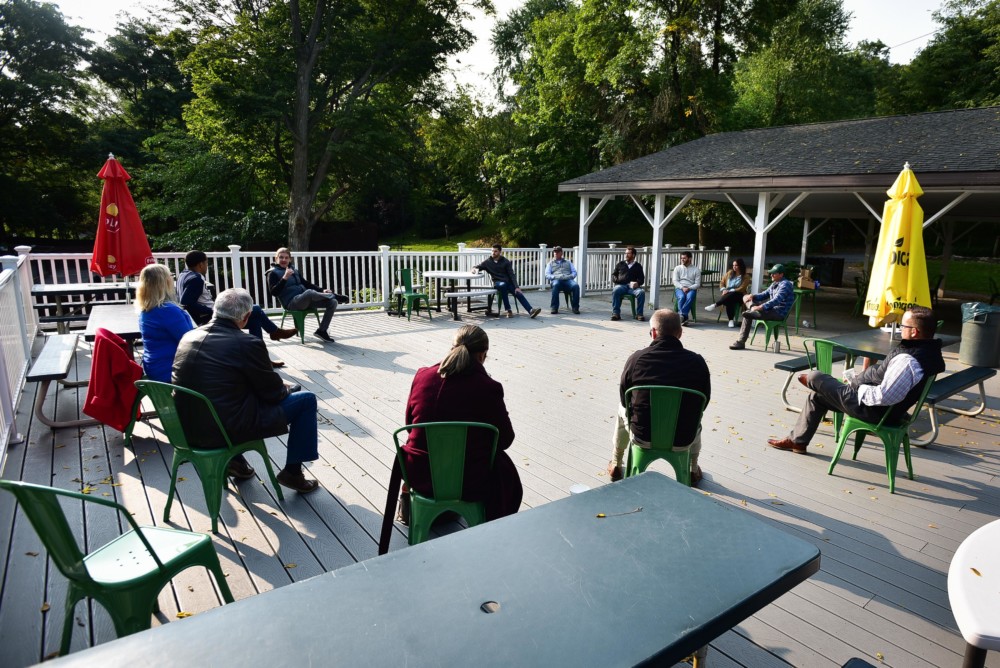By Steve Howe
Observer-Dispatch, Utica, N.Y.
WWR Article Summary (tl;dr) As Steve Howe reports, “Coffee and Concepts is part of the series of events hosted by the Innovation Collective, an Idaho-based organization, focused on stimulating economic activity by connecting entrepreneurs with regional resources.”
Utica
The air had an autumnal briskness but the dozen or so attendees of Coffee and Concepts at the pavilion at the Utica Zoo on Wednesday morning didn’t seem to mind.
Instead, their focus was on the latest news out of the sports, tech and entertainment worlds. The group ranged from the owner of a roofing company to a property manager, with tech and marketing professionals along as well.
The free-flowing conversation was directed by Taylor Brose, community manager for the Innovation Collective. Coffee and Concepts is part of the series of events hosted by the Innovation Collective, an Idaho-based organization, focused on stimulating economic activity by connecting entrepreneurs with regional resources.
The collective has set up shop in Utica through a $350,000 annual action plan funded by the Mohawk Valley Community College Foundation, Oneida County and private sector investors. The multi-year partnership, announced last September, follows the collective’s model in cities such as Coeur d’Alene, Idaho; North Las Vegas, Nevada; and Spokane, Washington.
The concept
When Nick Smoot founded the Innovation Collective in 2014, his vision was to unlock the latent potential in every member of communities around the country.
“The intent has really been how to bring the big opportunities that are happening in the world and connect average human beings to that, in a way that they can find their authentic fit,” Smoot said.
Now the collective’s CEO, Smoot said the formula revolves around building a community where individuals can brainstorm ideas and channel that creative energy into an industry.
“We work with the town to pick a vertical that the community then can start to serve as a group, defined by geography, that is talent and ideas and early stage products for that whole industry,” he said.
By focusing on a niche industry, or vertical, smaller cities can create an identity that makes them more appealing to major corporations and venture capitalists, Smoot said. The attention then leads corporate America to start investing dollars into ideas, joint ventures, learning initiatives and grants for schools, he said.
The objective is to repair capitalism by rebuilding communities, Smoot said. People are unhappy and wages are stagnant, but he doesn’t believe in solutions such as a universal basic income.
“It really just comes down to how do we fix the American dream?” Smoot said. “Because we’re not quite on the rails, it feels like, and there’s got to be a better way.”
Cities with populations between 40,000 and 80,000 have been a focus for the collective because they’re underperforming in a lot of ways and used to have larger populations, Smoot said. The Innovation Collective wants to help those communities punch above their weight class in recruiting jobs and talent.
How it works
The Utica offshoot of Innovation Collective is in the process of determining its area of focus, which Smoot said should be announced next month. The process of finding that focus begins by interviewing people in the community.
The collective looks at the resources the community has — schools, pent-up capital, work experience and more — along with the projects entrepreneurs are already working on. The idea, Smoot said, is to make a connection between those projects or interests and those resources.
To figure this out, the collective spent a couple of weeks in Utica discussing all kinds of topics, including where people would buy a used car, Smoot said. Trends in the answers to the collective’s questions can be one way to start to identify the community’s niche.
“It gives us really fun qualitative and quantitative feedback,” Smoot said.
While Innovation Collective speaks with economic development leaders and college professors, they also speak with the average Joe and Jane residents, Smoot said.
Public engagement
After gathering information on the initial visit, the collective hires local community managers such as Brose to head up in-person events such as Coffee and Concepts and fireside chats with guest speakers.
“When you get people to come out of their living rooms and come into a space … that also gives people the sense of community and culture that they weren’t necessarily tapped into before,” Brose said.
The events allow people to share their crazy ideas for businesses and projects, Brose said. It leads to meeting people and inherently networking, when the person next to you is doing the same thing, he said.
The pandemic put a wrench in the works of in-person meetings earlier this year, but meetings are now happening with masks or outdoors with social distancing.
Coffee and Concepts are every first and third Wednesday of the month and fireside chats are less frequent, but bring in speakers such as Alicia Dicks, the president and CEO of the Community Foundation of Herkimer and Oneida Counties.
The first annual Think Big Festival will be held Oct. 22, 23 and 24, featuring Arabian Prince, a founding member of rap group NWA, former NBA player Josh Childress and other speakers. The three-day event will focus on technology, entertainment and sports. Tickets for the event are $14.95 and can be purchased online through innovationcollective.zohobackstage.com.
In the past five months, Brose said Utica residents have pitched more than 40 ideas to him through the collective’s outreach.
“I’m bullish that Utica will be one of those shining gems over the next decade and it’s already been on that trajectory, but in a fashion that people should be really proud of,” Smoot said. “And we’re excited to be a part of it.”
___
Distributed by Tribune Content Agency, LLC.














































































































































































































































































































































































